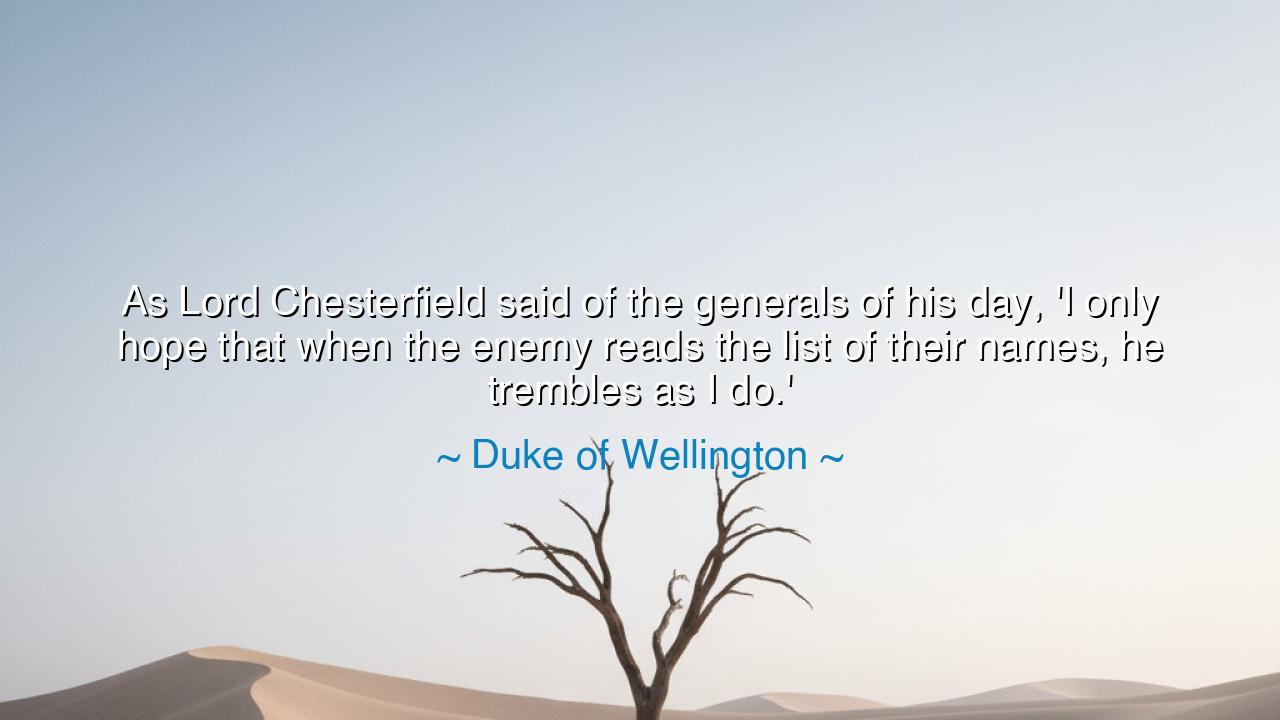
As Lord Chesterfield said of the generals of his day, 'I only
As Lord Chesterfield said of the generals of his day, 'I only hope that when the enemy reads the list of their names, he trembles as I do.'






The words of the Duke of Wellington, “As Lord Chesterfield said of the generals of his day, ‘I only hope that when the enemy reads the list of their names, he trembles as I do,’” are steeped in irony and wisdom, born of the hard-earned realism that only a true commander could possess. In this remark, the Iron Duke—hero of Waterloo and one of history’s greatest military minds—reveals both his humility and his deep understanding of human frailty. It is a statement that blends humor with gravity, and in its depths lies a timeless truth: that leadership, though draped in honor and ceremony, is always shadowed by doubt, imperfection, and the sobering weight of responsibility.
The origin of the quote traces back to Lord Chesterfield, the 18th-century statesman and wit, who once spoke these words to describe his skepticism about the generals of his time. When the Duke of Wellington echoed them, he did so not as mockery, but as a confession of the burden every leader bears—the fear that those entrusted with command may not be equal to the moment when fate demands their strength. He knew, better than most, that the destiny of nations often rests not on the grandeur of titles, but on the courage, discipline, and clarity of those who wear them. Thus, when he said he hoped the enemy trembled as much as he did, he was acknowledging that even the great feel the chill of uncertainty before the storm of war.
In these words shines a deep humility. Wellington, who led the British forces to victory over Napoleon at Waterloo in 1815, was a man of unflinching discipline and cold precision, yet beneath his iron exterior beat a heart of immense responsibility. He had seen the chaos of battle, the price of misjudgment, and the frailty of even the mightiest armies. To command men is to bear the weight of their lives, and to know that every decision carries the shadow of death. Thus, his jest was no mere self-deprecation—it was the voice of wisdom that comes from knowing that courage is not the absence of fear, but the mastery of it.
History is filled with examples that echo Wellington’s sentiment. In the trenches of the First World War, countless generals commanded from afar, detached from the horror of the front, while the soldiers beneath them paid the price for their errors. But among them rose leaders who, like Wellington, understood the true measure of command—not arrogance, but accountability. Field Marshal Bernard Montgomery, before leading his troops at El Alamein, admitted openly to his men that success was uncertain, that war was chaos, but that together, through discipline and resolve, they could shape order from it. Such leaders inspire not by pretending to be fearless, but by showing courage in the presence of fear.
Wellington’s words also carry a subtle rebuke to vanity and false confidence. Many men crave command for the power it seems to promise, but few comprehend the weight it brings. The true leader, as the ancients taught, must be both lion and lamb—bold in action, yet humble in reflection. The enemy that trembles at the sound of our names is not conquered by bravado, but by the quiet excellence of preparation, intelligence, and integrity. The Duke understood that the most dangerous general is not the one who boasts, but the one who doubts wisely, who questions his own strength so that he may strengthen it.
At its core, this quote is a meditation on the nature of leadership itself. The greatest leaders, whether in war, governance, or life, are not those who feel no fear—they are those who channel fear into vigilance. To tremble is not weakness; it is awareness. The wise leader, like Wellington, understands that overconfidence blinds, while humility sharpens vision. When one fears the gravity of the task before them, they approach it with reverence, care, and preparation. Thus, the trembling that Wellington speaks of is not the trembling of cowardice, but of conscience—a sacred fear that ensures one does not lead recklessly.
The lesson, then, is both noble and eternal: humility is the armor of the wise, and fear, when mastered, becomes strength. Whether one leads an army, a household, or a company of workers, one must carry within the heart both courage and caution. Rejoice not in titles or victories, but in the duty to serve with integrity. As the Duke of Wellington once did, let every leader ask themselves not whether others tremble at their name, but whether they have earned the right to command through wisdom, sacrifice, and moral strength.
So, remember these words, O children of the future: when the day comes that you bear responsibility over others, let not pride fill your chest, but a sacred trembling—a humility that reminds you of your duty to justice, to truth, and to those who follow your lead. For it is this trembling that keeps the spirit pure, the mind alert, and the hand steady in the face of destiny. And may it be said of you, as of Wellington, that your courage was born not of blindness to fear, but of mastery over it.






AAdministratorAdministrator
Welcome, honored guests. Please leave a comment, we will respond soon